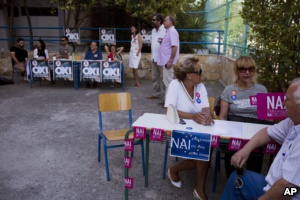Greek Voting Ends on Bailout Referendum
 Voting has ended in Greece’s crucial referendum Sunday on the country’s economic future that could determine whether Athens is ousted from the 19-nation euro currency bloc, reports VOA.
Voting has ended in Greece’s crucial referendum Sunday on the country’s economic future that could determine whether Athens is ousted from the 19-nation euro currency bloc, reports VOA.
Results are expected in the coming hours.
But two exit polls of voters and three surveys conducted in the days leading up to the balloting all suggested that Greeks are narrowly rejecting the demands of the country’s international lenders that Athens impose new austerity measures in exchange for more bailout loans.
German Chancellor Angela Merkel and French President Francois Hollande said they would meet Monday in Paris to “evaluate the consequences” of the Greek vote.
Leaders confidence
Prime Minister Alexis Tsipras has urged voters to reject the conditions, which include more tax hikes and spending cuts. He says a “no” vote will give Greeks a better negotiating position with European Union finance ministers.
To loud cheers from supporters, Tsipras arrived to cast his vote in a suburb of Athens. On the day of reckoning for Greece, he struck an optimistic tone.
“Today democracy overcomes fear and blackmail,” he said. “The determination of our people beats the propaganda of fear. I’m sure that from tomorrow, we’ll open the road of a return to the fundamental values of Europe.”
Greek voters had to decide between the Prime Minister’s assurances that this is just part of the poker game with Europe and warnings from Brussels that a “no” vote could see Greece ejected from the euro.
Nearly 10 million people were registered to vote in the referendum and voting was reported to be brisk at many polling stations.
Greek Finance Minister Yanis Varoufakis, who says he would resign from the government Monday if his countrymen voted in favor of accepting the austerity demands, called the vote “a holy moment.”
“The massive failures of the eurogroup were leading to ultimatums for which the Greek people had no say,” Varoufakis said after voting. “Today, after five years of failure, the Greek people have the opportunity to decide on the last ultimatum of the eurogroup, the institutions and our partners. This is about a holy moment. A moment of hope for the whole of Europe – a moment that gives hope to Europe that the common currency and democracy can co-exist, and they co-exist.”
Opinion divided
A woman voter said she was undecided until the last minute. She has two small children and is anxious for the future. “Though I am determined to make even more sacrifices for Greece to get over the crisis and have a better quality of life,” she says.
But the “No” campaign says Brussels’ warnings of a Greek exit are just a bluff.
Iasonas Liberis, an observer for the “No” campaign, said there are rules in the EU, and the EU is not the property of the technocrats. The democratic will of the people of Europe must be accepted.
Greek Finance Minister Yanis Varoufakis accuses the EU of “terrorism” by trying to scare the Greeks into voting their way.
But those in the “yes” camp say Greece has no choice but a European future. Being forced out of the eurozone means Greece would have to go back to using the old currency, the drachma – money that some outside Greece could refuse to accept.
A miserable week
The week leading up to Sunday’s referendum has been a miserable one for most Greeks.
Banks put strict limits on withdrawals to avoid running out of funds, although ATMs ran out of cash several times. Supermarkets are fast running out of basic foods. Storekeepers are reluctant to restock shelves because of the uncertainty of how they would be able to pay for the supplies.
The Europeans accuse Athens of refusing to make any more economic reforms while the Greeks say they have sacrificed enough and feel enslaved to their creditors.


